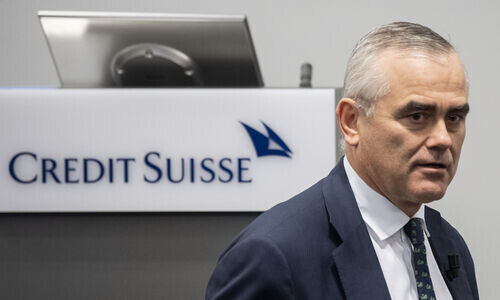After a collapse in profits at its asset management unit last year, the Swiss bank is shutting a controversial set of funds. The latest misstep at the unit raises the stakes in a strategic review.
Thomas Gottstein was sanguine last month, after a 60 percent drop in profit before taxes from asset management: the unit, he pledged, would normalize its profits over the course of 2021.
Five months ago, Gottstein disclosed Credit Suisse is reviewing its «barbell» strategy at the unit, which has spent the last five years in specialized niches of private investments as well as passive strategies – and not much in between the two prongs.
«Savior of Steel» Blocked
It is the alternatives arm which has caused it the most trouble: the Zurich-based bank shut a series of supply chain funds through which it manages more than $7 billion, together with Greensill Capital. The funds are blocked, as part of the funds assets are «currently subject to considerable uncertainties with respect to their accurate valuation.»
Neither Credit Suisse nor Greensil, which acknowledged the move and said it was looking at other options, named the assets. The trouble appears to center around GFG Alliance, a financial imperium through which British billionaire Sanjeev Gupta has bought up distressed industrial assets across Europe.
The fact that Gupta, also known as the «savior of steel», is one of Greensill's biggest clients reportedly was a major concern for Credit Suisse. Greensill, which as recently as last month was preparing a public listing for this year, now faces possible insolvency after the Swiss bank pulled the plug.
Financial Investors Nixes
U.S. investor Apollo reportedly denied Greensill a refinancing due to GFG's prominence in the latter's portfolio, according to the «Financial Times» (behind paywall). German financial regulator Bafin also asked Greensill's bank in Germany to reduce its ties to Gupta, the pink paper had reported previously.
For Credit Suisse's top asset managers, Eric Varvel as well as Swiss and Europe head Michel Degen, reason enough to pull the plug. A spokeswoman for the bank declined to elaborate on the GFG positions, and what Credit Suisse plans to do with them.
Kissing Off Hedge Fund
For the Swiss wealth manager, the episode represents more of the same: it kissed off $450 million last year on a decade-old investment in U.S. hedge fund York in December – the most recent and most expensive in a series of missteps and woes in recent months.
In December, Credit Suisse said it will wind down two insurance-linked funds after two reinsurers stopped writing new policies. It also wrote down York, unwound a controversial Softbank tie-up, and quietly folded a quant unit in asset management. The unit is dwarfed by flagship wealth management activities and by an investment bank.
Urgency Underscored
All the events occurred after Gottstein flagged the strategic review of the business, which is folded into a wealth unit overseen by Philippe Wehle. Credit Suisse hadn't been expected to embark definitely on the path forward until mid-2021, though Greensill certainly underscores the urgency.
Insiders emphasize that the $7 billion in Greensill co-managed money is a drop in the bucket for the unit, which manages 440 billion Swiss francs overall. There is little substantial indication Credit Suisse intends to abandon asset management altogether.
Lucrative Returns Vs Liquidity
What seems increasingly obvious is that the unit's woes, while unrelated, in sum represent a major setback for Credit Suisse's alternative investment business. The unit's hugely attractive potential returns are accompanied by a high degree of complexity and poor liquidity.
The latter trait is what ultimately sparked the problem with the Greensill funds, as well as the quantitative push, triggered by market turbulence amid the pandemic. Little hope for CEO Gottstein's promise for more «normalized» profits this year.




































